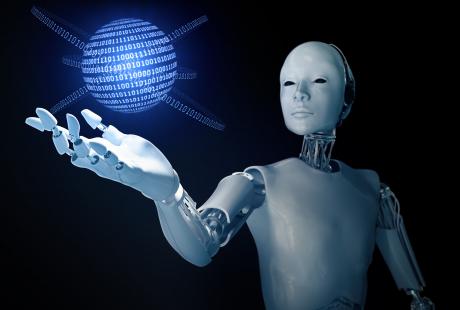The term “artificial intelligence” was coined over 60 years ago by the godfather of AI, John McCarthy.
Whilst AI has massively evolved since then, its premise is still the same: researchers and technologists working to create software that operates systems and machines built to understand, simulate and mimic human tasks and our thought process.
Science fiction frequently depicts the future of AI as insubordinate robots who overthrow their creators and attempt to take over the world. But what is the reality?
The fact is, we’re much closer to developing machines and systems that enhance our abilities and complement our own minds.
>See also: AI will be the number one transformative technology of the next decade – so get prepared
In terms of development, recently we’ve seen Northwestern University Professor Ken Forbus and his team develop a structure-mapping engine (SME) model, fostering analogical problem solving capabilities such as “capturing the way humans spontaneously use analogies between situations to solve moral dilemmas.”
Essentially, the model allows computers to rationalise and imitate the human cognitive process.
This new development gives us a preview of what the future of work looks like.
While we apply AI in analytics to predict outcomes or to automate mundane tasks, we’re also making major strides toward developing AI that is interactive and to help us make critical decisions.
Similarly, researchers at the National Research Nuclear University in Moscow are working on an “emotional” computer with the ability to understand context, develop rapport with humans through emotional actions and eventually build trust.
We can expect this human side of AI to become the norm as humans begin to develop reliance and credence in AI systems.
>See also: The beginning of AI in the enterprise
It’s easy to see how AI can and will impact the world of work, but it’s also import to consider the profound impact it will have on the future of education.
Using computer vision, animatronics, motors and AI, the Cozmo robot (a product from Anki) recognises faces and adapts to users over time through familiarisation.
Cozmo could viably be used in our classrooms, helping students observe and identify emotions, develop critical thinking through games and identify behavioural differences.
This represents an example in how future generations will experience technology in the classroom in profoundly different ways as AI capabilities grow.
It will impact both how students learn and also what they’re taught.
Considering the strong possibility that AI will likely render most repeatable tasks moot, students will only need to possess basic coding knowledge to create an application or program.
The weight and burden of most coding — from writing to refinement — can and will be carried out by AI systems.
>See also: 3 ways artificial intelligence is transforming e-commerce
Paradoxically, this means students will need an understanding of AI and coding.
In the classroom, generations of students will experience AI that will learn from engaging with us, while it amplifies the ability of the teacher as well. It’s one of the many scenarios in which the technology will present fundamental challenges even as it helps us.
For organisations and individuals to benefit from AI, however, we must incorporate knowledge-based systems that curate information from across technologies and business units, automatically learn from it and use that knowledge to intelligently drive automated systems to amplify existing capabilities.
In this way, everyone in an organisation – along with its customers and partners – can enhance their performance thanks to the collective, evolving knowledge of AI that learns, remembers and informs.
AI’s power is not in machine learning or automation but knowledge – discovery, creation and management of knowledge.
>See also: The rise of the machine: AI, the future of security
In every instance, the future of work and education depends upon the human component of AI.
It’s important to think of AI as service – it exists to improve how we work, learn and live. It amplifies our ability to solve problems large and small.
AI will find not just new solutions but new problems, and that is its most exciting potential: it frees us to think and collaborate to tackle new, interesting and life changing challenges.
And that brings us to the ultimate potential: as AI becomes more human, it will transform us into super-humans.










